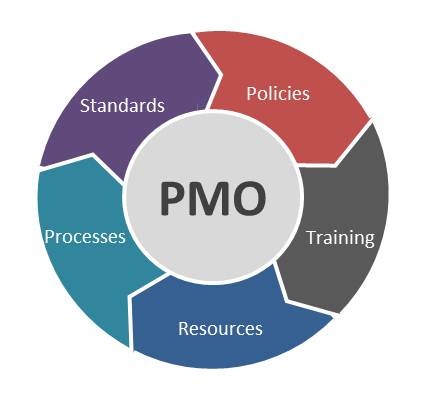How PMOs and Project Managers Work Together to Achieve Success
Introduction
In the realm of project execution and management, two key terms often come up: PMO (Project Management Office) and project management. While they are related, it’s important to understand the distinctions between the two and recognize how they can work synergistically to drive successful project outcomes. This blog post aims to shed light on the differences and synergies between PMO and project management, highlighting their respective roles and contributions.
Understanding PMO
The Project Management Office (PMO) is a centralized entity within an organization responsible for overseeing and governing the project management process. The PMO sets standards, best practices, and provides support and guidance to project managers throughout the project lifecycle. It acts as a strategic function that aligns project management activities with the organization’s goals, objectives, and overall business strategy.
Exploring Project Management
Project management refers to the discipline of planning, organizing, and controlling resources to achieve specific project objectives within defined constraints. It involves various activities, including defining project goals, creating project plans, managing budgets and resources, monitoring progress, and mitigating risks. Project management is a hands-on practice that involves the day-to-day implementation and execution of projects.
Key Distinctions
a. Focus and Scope
PMO has a broader focus that extends beyond individual projects. It concentrates on establishing project management methodologies, governance frameworks, and ensuring consistent project execution across the organization. On the other hand, project management primarily focuses on managing specific projects, including tasks, timelines, and deliverables.
b. Strategic vs. Tactical
The PMO operates at a strategic level, aligning projects with the organization’s strategic objectives, and providing guidance on portfolio management, resource allocation, and risk management. Project management, however, is more tactical, focusing on the execution and delivery of individual projects.
c. Governance and Oversight
PMO plays a crucial role in providing governance and oversight to project managers. It establishes project management standards, monitors project performance, and facilitates knowledge sharing and collaboration. Project management, on the other hand, is responsible for day-to-day project execution, managing stakeholders, and ensuring project success.
Synergies and Collaboration
While PMO and project management have distinct roles, they are interdependent and can work together to enhance project outcomes:
a. PMO Support for Project Managers
PMOs provide support and resources to project managers, ensuring they have the necessary tools, training, and guidance for successful project execution. This support includes access to templates, methodologies, and lessons learned from previous projects.
b. Project Management Input for PMO
Project managers, being the ones implementing projects on the ground, provide valuable insights and feedback to the PMO. They can contribute to refining project management processes, identifying areas for improvement, and suggesting enhancements to project governance.
c. Collaboration in Decision-Making
PMOs and project managers collaborate in decision-making processes, particularly for strategic project selection, resource allocation, and risk management. The PMO’s strategic perspective combines with the project manager’s operational expertise to make informed decisions that align with organizational objectives.
Benefits of PMO and Project Management Collaboration
a. Standardization and Consistency
PMO establishes standardized project management processes, methodologies, and templates, promoting consistency in project execution. Project management ensures adherence to these standards, resulting in uniformity across projects.
b. Resource Optimization
PMO oversees resource allocation across projects, ensuring optimal utilization of resources and preventing overallocation or duplication. Project management provides input on resource requirements and collaborates with the PMO to align resources with project needs.
c. Risk Mitigation
PMO identifies and manages project risks at an organizational level, while project management addresses project-specific risks. Collaboration between the PMO and project managers helps in comprehensive risk identification, assessment, and mitigation strategies.
d. Knowledge Sharing and Lessons Learned
PMOs facilitate knowledge sharing by capturing lessons learned from completed projects and disseminating them to project managers. This collaboration enables project managers to benefit from past experiences and avoid repeating mistakes.
Communication and Stakeholder Management
a. PMO’s Role
PMOs play a vital role in communication and stakeholder management at an organizational level. They establish communication channels, develop stakeholder engagement strategies, and provide guidance on effective communication practices.
b. Project Manager’s Responsibility
Project managers handle day-to-day communication with project stakeholders, ensuring timely and accurate information flow, managing expectations, and addressing any project-related concerns or issues.
Scalability and Flexibility
a. PMO’s Perspective
PMOs consider the organization’s strategic objectives and overall project portfolio to ensure scalability and alignment with long-term goals. They assess resource availability, budget constraints, and project prioritization.
b. Project Manager’s Approach
Project managers focus on the specific requirements, constraints, and deliverables of their projects. They adapt and tailor project management processes to suit the project’s unique needs and constraints.
Continuous Improvement
a. PMO’s Role
PMOs drive continuous improvement initiatives by analyzing project performance data, identifying bottlenecks, and suggesting process enhancements. They foster a culture of learning and improvement within the organization.
b. Project Manager’s Contribution
Project managers provide valuable feedback on project execution challenges, potential process improvements, and areas requiring additional support. Their insights contribute to refining project management practices.
Conclusion
PMO and project management play distinctive yet complementary roles in achieving successful project outcomes. The PMO provides strategic oversight, governance, and support, while project management focuses on executing and delivering individual projects. Recognizing the distinctions and understanding the synergies between the two can lead to effective project management practices, improved project success rates, and enhanced organizational performance. By fostering collaboration and leveraging the strengths of both PMO and project management, organizations can achieve better project outcomes and align projects with their strategic vision.

